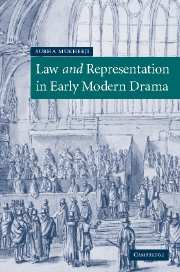Book contents
- Frontmatter
- Contents
- List of illustrations
- List of maps
- Acknowledgements
- Glossary
- A note on the text
- List of abbreviations
- Introduction
- 1 ‘Of rings, and things, and fine array’: marriage law, evidence and uncertainty
- 2 ‘Unmanly indignities’: adultery, evidence and judgement in Heywood's A Woman Killed With Kindness
- 3 Evidence and representation on ‘the theatre of God's judgements’: A Warning for Fair Women
- 4 ‘Painted devils’: image-making and evidence in The White Devil
- 5 Locations of law: spaces, people, play
- 6 ‘When women go to Law, the Devil is full of Business’: women, law and dramatic realism
- Epilogue: The Hydra head, the labyrinth and the waxen nose: discursive metaphors for law
- Appendix
- Bibliography
- Index
Introduction
Published online by Cambridge University Press: 18 December 2009
- Frontmatter
- Contents
- List of illustrations
- List of maps
- Acknowledgements
- Glossary
- A note on the text
- List of abbreviations
- Introduction
- 1 ‘Of rings, and things, and fine array’: marriage law, evidence and uncertainty
- 2 ‘Unmanly indignities’: adultery, evidence and judgement in Heywood's A Woman Killed With Kindness
- 3 Evidence and representation on ‘the theatre of God's judgements’: A Warning for Fair Women
- 4 ‘Painted devils’: image-making and evidence in The White Devil
- 5 Locations of law: spaces, people, play
- 6 ‘When women go to Law, the Devil is full of Business’: women, law and dramatic realism
- Epilogue: The Hydra head, the labyrinth and the waxen nose: discursive metaphors for law
- Appendix
- Bibliography
- Index
Summary
LAW AND THEATRE: REPRESENTATION AND RHETORIC
‘The law is theatre’, said Sartre, in an interview with Kenneth Tynan in 1961; ‘for at the roots of theatre is not merely a religious ceremony, there is also eloquence … The stage is a courtroom in which the case is tried.’ But dramatic works in different periods and places spring from different roots. Sartre was commenting on Greek tragedy, and his remark might even be equally applicable to the televised drama of American courts in our own times. However, in early modern England – the focus of this book – the roots, as well as forms, of drama were more mixed, as were the institutional forms of litigation. While the Athenian trial was a public spectacle with a clearly adversarial structure where both litigants presented their own case, trials in sixteenth- and seventeenth-century England were jurisdictionally varied, mediated by counsel except in criminal cases, and consequently less starkly agonistic events. Yet the theatre-as-court metaphor is pervasive in Renaissance drama, sometimes suggesting the theatricality of trials, at other times the judicial structure of drama. Francis Beaumont, in his commendatory verses to The Faithful Shepherdess (1610), describes the Blackfriars playhouse as a court ‘where a thousand men in judgement sit’. Dramatists such as Kyd, Marlowe, Shakespeare, Jonson and Webster repeatedly open up the action of their plays, explicitly or implicitly, to the judgement, even ‘sentence’, of the theatre audience.
- Type
- Chapter
- Information
- Law and Representation in Early Modern Drama , pp. 1 - 16Publisher: Cambridge University PressPrint publication year: 2006



